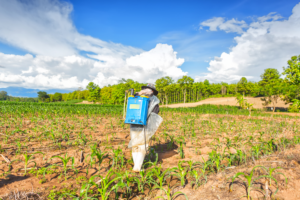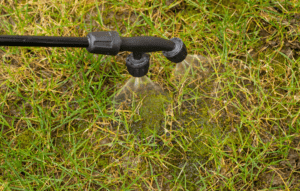
Lawsuit Against Monsanto Allow Glyphosate To Be Added To The List As Chemical Cause Cancer. Parties involved in lawsuits against Monsanto, maker of the weed killer Roundup (glyphosate), hailed a California judge’s “tentative decision” to allow glyphosate to be added to the “list of chemicals known to the state of California to cause cancer” under California’s […]

Lawsuit Against Monsanto Allow Glyphosate To Be Added To The List As Chemical Cause Cancer. Parties involved in lawsuits against Monsanto, maker of the weed killer Roundup (glyphosate), hailed a California judge’s “tentative decision” to allow glyphosate to be added to the “list of chemicals known to the state of California to cause cancer” under California’s Proposition 65.
Prop 65 makes it mandatory for the California Office of Environmental Health Hazard Assessment (OEHHA), a division of the California Environment Protection Agency, to list all known cancer causing chemicals. Roundup has been manufactured and sold by Monsanto for decades and is registered for use in 130 countries.
Parker Waichman notes that Roundup exposure has been associated with a range of health problems, including leukemia, non-Hodgkin’s lymphoma, respiratory distress, pulmonary edema, arrhythmias, renal failure, hand tremors, blurred vision, and loss of coordination.
California’s plan to add glyphosate to its Prop 65 list of cancer causing chemicals follows a finding by the World Health Organization’s International Agency for Research on Cancer (IARC) that Roundup (glyphosate) is “probably carcinogenic to humans.” IARC announced a “positive association has been observed for non-Hodgkin lymphoma.” IARC’s research showed “glyphosate also caused DNA and chromosomal damage in human cells.”
Roundup (glyphosate) is one of the world’s largest herbicides by sales volume. In 2000, Roundup outsold other weed killers by a margin of five to one and Roundup sales produce a major portion of Monsanto’s revenues.
When genetically modified organisms (GMO) crops were being introduced in the early 1990s, biotech companies claimed numerous benefits. GMO crops could produce more nutritious food, resist climate stress, and reduce pesticide use. But, in fact, the characteristic most widely engineered was the crops’ ability to withstand Roundup. With Roundup-resistant crops, the farmer could spray a field with weed killer without concern for damaging the crop.
Today, 90 percent or more of the corn, soy, canola, and sugar beets grown in the U.S. are varieties that have been engineered to tolerate glyphosate, the Huffington Post reports. For Monsanto, the combination of engineered seeds and Roundup puts the company in a strong position in the agriculture market. And in addition to commercial agriculture, Roundup is widely used by home gardeners, and in public gardens and parks, roadsides and forests.
Food safety testing done by the organization Food Democracy Now found high levels of the glyphosate residue in some of America’s most popular food products, including Cheerios, Oreos, Doritos, and Ritz Crackers. Probable harm to human health could begin at glyphosate levels as low 0.1 parts per billions (ppb), according to Food Democracy Now. Glyphosate residue cannot be removed by washing, is not broken down by cooking or baking, and can remain stable in food for a year or more, even if the foods are frozen or processed.
 Many countries have responded quickly to the IARC designation of Roundup as a probable human carcinogen. France, The Netherlands, Sweden and Italy are debating whether to relicense the herbicide. The French Minister of Ecology has called for a ban on glyphosate herbicides across the EU, according to The Guardian. Colombia halted the use of glyphosate in its coca eradication program and Bermuda, Sri Lanka banned import of glyphosate products, the Huffington Post reports.
Many countries have responded quickly to the IARC designation of Roundup as a probable human carcinogen. France, The Netherlands, Sweden and Italy are debating whether to relicense the herbicide. The French Minister of Ecology has called for a ban on glyphosate herbicides across the EU, according to The Guardian. Colombia halted the use of glyphosate in its coca eradication program and Bermuda, Sri Lanka banned import of glyphosate products, the Huffington Post reports.
California’s tentative decision to add glyphosate on the state’s list of cancer causing chemicals could have nationwide impact. Alexis Bader Mayer, the political director with the Organic Consumers Association, said California’s decision “may influence Environmental Protection Agencies in other states” to take similar action. The Organic Consumers Association is a non-profit advocacy group focused on health and justice issues. The association is a long-time opponent of the use of Roundup and glyphosate.
The judge’s ruling is only tentative. She is now considering the oral arguments and is expected to issue a final ruling soon.
Monsanto has said it would appeal any final decision to add glyphosate to the Prop 65 carcinogen list. Monsanto’s vice president of regulatory affairs, Phil Miller said, “Based on the overwhelming weight of evidence, regulatory agencies have concluded for more than 40 years that glyphosate can be used safely.” But in March 2015, the International Agency for Research on Cancer (IARC), a branch of the World Health Organization, identified Roundup as “a possible human carcinogen.” IARC reported “limited evidence of carcinogenicity in humans for non-Hodgkin lymphoma.”
The personal injury attorneys at Parker Waichman LLP offer free, no-obligation case evaluations. For more information, fill out our online contact form or call 1-800-YOURLAWYER (1-800-968-7529).


